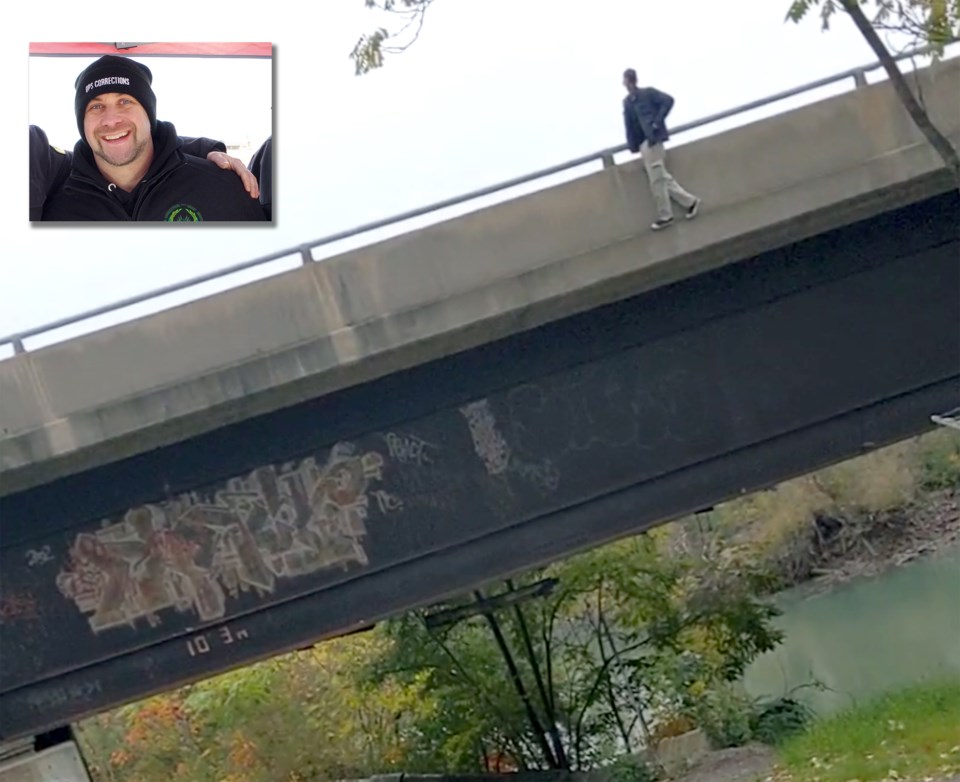An ordinary drive turned into a lifesaving rescue for Rocky Newton last Friday.
A corrections officer and crisis negotiator at the Niagara Detention Centre in Thorold, Newton told ThoroldNews, “I was driving home, crossing the bridge that takes you to Fourth Ave. over the (Hwy.) 406, and I could see somebody straddling the bridge.”
That set his senses on high alert, he said.
“I was watching and as I drove past it, I saw the legs swing over to get to the other side of the bridge, so I slowed down, and thought, ‘Oh God, what’s going to happen’?”
Newton then turned down a nearby side street—Wellandvale Avenue—to get a better look.
“And as I turned, I could recognize who the guy was, because this guy has been coming to the jail frequently throughout my career,” mostly incarcerated for “street crimes,” such as theft.
Exiting his truck, Newton said he “started shouting” the man’s first name, letting him know that he’d been recognized.
“He said, ‘I’m gonna jump.’ I kept yelling, ‘Stop, don’t do it! Wait for me. I want to talk to you’.”
“And he said, ‘Okay, I’ll come back up’” from the ledge, explained Newton.
“He got back up on the bridge and walked over to the side street, sat on the grass, and bawled his eyes out. He said he has no job, no money for rent, and Out of the Cold hasn’t opened yet” to shelter homeless people for the season.
After talking “for a good 10 minutes,” Newton said, “I convinced him he had to go to the hospital.”
He seemed to be “high on crystal meth. I found needles and drugs on him, and I took it and put it in his coat pockets, and put his coat in my truck.”
By that time, “Somebody else must’ve called the police. He wanted nothing to do with them.”
The man was in a very “agitated” state, said Newton. “The police asked me to talk to him. I convinced him to go see mental health” staff at the St. Catharines hospital, “but the only way he’d go is if I drove him.”
At the hospital, the pair arrived at triage, “and he started panicking,” Newton said. “He said he didn’t want to go in there. I said, ‘You’ve got to trust me.’ I convinced him to stay, and when he told the nurse things that weren’t true, I made him tell the truth to me, so they could hear it. The mental health nurses recognized him, and got him a room right off the bat.”
Again, when it came time to change him into a gown, he refused.
“So he trusted me. Part of my job as a corrections officer is to strip him. Because I had that rapport with him” prior to Friday’s incident, “it was very nice to see he trusted me.”
Toward the end of the two-hour ordeal, the man turned on Newton, “calling me a super hero,” he said. “But he was in care.”
Estimating the man to be “in his 40s,” Newton said, “In the past, he’s had thoughts of suicide, so he could have done this. He’s got mental health issues because he has a horrible past. He doesn’t have any family.”
Newton, who’s been a corrections officer for 13 years, said it’s not uncommon for inmates to bond with them.
To prisoners, police are perceived as “the bad guys” because they arrest them, he explained.
“As a corrections officer, I’m not punishing them; I’m there to protect them. I’m a crisis negotiator, so my background is talking to these guys. I’m almost like a father figure to them. In order for them to get anything—such as a toothbrush, or new shoes, or a visit—they have to be nice to us.”
Newton said he appreciated the police and hospital employees taking a step back, due to the man’s distrust.
“They could see he was only listening to me, and they kind of let me be his voice; his caregiver. They knew if I wasn’t there, it would probably escalate.”
Describing his negotiator training as “top-notch,” he said it’s provided through the province, and done in-house at the Thorold jail.
“Four of us train once a month together, and then have to get recertified” in order to constantly stay effective.
“We’ve got to lean on each other.”
If you or someone you know is feeling suicidal, it's important to seek help.
The Canadian Mental Health Association recommends you contact your doctor, go to a hospital, contact a local crisis line or call 9-1-1 or Telehealth Ontario at 1-866.797-0000.
More information and resources on suicide prevention are available from CAMH.



